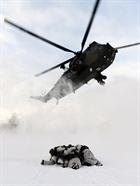845NAS support 45 Cdo in Arctic training
Royal Marines have completed six weeks of Arctic training with an all-out assault on one of the relics of Hitler’s vaunted Fortress Europe. The green berets of Arbroath-based 45 Commando, plus the Commando Logistic Regiment from North Devon and their supporting air power, the Commando Helicopter Force at Yeovilton, staged a three-hour attack on a wartime fortress near Harstad in northern Norway – as the climax of Exercise Cetus 13.
The marines decamped from their bases in the UK to join the Norwegians at the small port, some 150 miles north of the Arctic Circle for Exercise Cetus 13. There is no harsher environment in which to live, work and fight – deep snow, ice, temperatures fall regularly below -30°C (and take it down another 20°C with wind chill). Such conditions test men and machines to the limit. Around 135 green berets from 45 Commando – currently the UK’s lead commando group, who are ready to deploy around the world at short notice should they be required – crossed the North Sea for Cetus 13, using the Norwegian Army camp at Åsegarden, just outside Harstad, as their base.
Having mastered the arts of survival in the Arctic – living in snow holes (a man-made ‘cave’ carved out of the snow), skiing, marching on snow shoes for five kilometres (three miles) with 30kg (66lb) of kit on their backs, personal care (such as not touching exposed metal) – it was time to move on to the fighting element of the training. Cetus reached its climax on the Trondes Peninsula on the northern side of Harstad harbour –
and home to a formidable relic of the Third Reich. Batterie Theo – today known as Trondesnes Fort – was part of the Atlantic Wall, the chain of
defences built by the Germans from Biscay to the North Cape to prevent the Allies storming Fortress Europe. The battery and bunker complex serves the ‘Adolfkanonen’ – Adolf Guns – four mighty 40.6cm (16in) cannons which could hurl a 1,030kg (2,300lb) shell up to 56 kilometres. One of the guns is preserved in working order by the Norwegians to this day. With the Norwegian Army defending the fort (currently home to their coastal rangers) 45’s Yankee Commando staged a three-hour-long assault on the imposing fortification, launching simultaneous attacks on three enemy positions. The attack ended with the Adolf Guns in Royal Marines hands before three Norwegian Huey helicopters and Fleet Air Arm ‘Jungly’ Sea Kings of 845 Naval Air Squadron swept up the fjord to extract the Yankee men – and Cetus 13 was completed. “It’s been good to put into practice the skills we’ve learned over the past month. This is my first time in Norway and fighting in the extreme cold is a totally different challenge entirely,” said Marine Tony Curtis, aged 19 of Newcastle. 45 Commando are the UK’s experts in cold weather warfare. Based at RM Condor in
Arbroath, their year-long stint as the on-call commando unit ends in May when the green berets of 42 Commando at Bickleigh, near Plymouth, take over the duty.
Royal Navy Sea King Mk4 helicopter pilots, aircrews and engineers from 845 Naval Air Squadron Commando Helicopter Force (CHF) normally based at the Royal Naval Air Station Yeovilton in Somerset have also completed their own annual winter training by taking part in a forward operating base exercise (FOBEX). The training takes part some 200 miles inside the Arctic Circle at the Joint Helicopter Command (JHC) base near Bardufoss, Norway. The JHC base known as 'Clockwork' provides survival and operational training and support facilities to enable aviation capable units arms to survive, operate and fight in extreme C2 environments. Amongst other survival techniques, Royal Naval personnel from 845 Naval Air Squadron practised forming an 'Arctic huddle', necessary as a Royal Navy Sea King Mk4 helicopter lands whipping up the snow.




